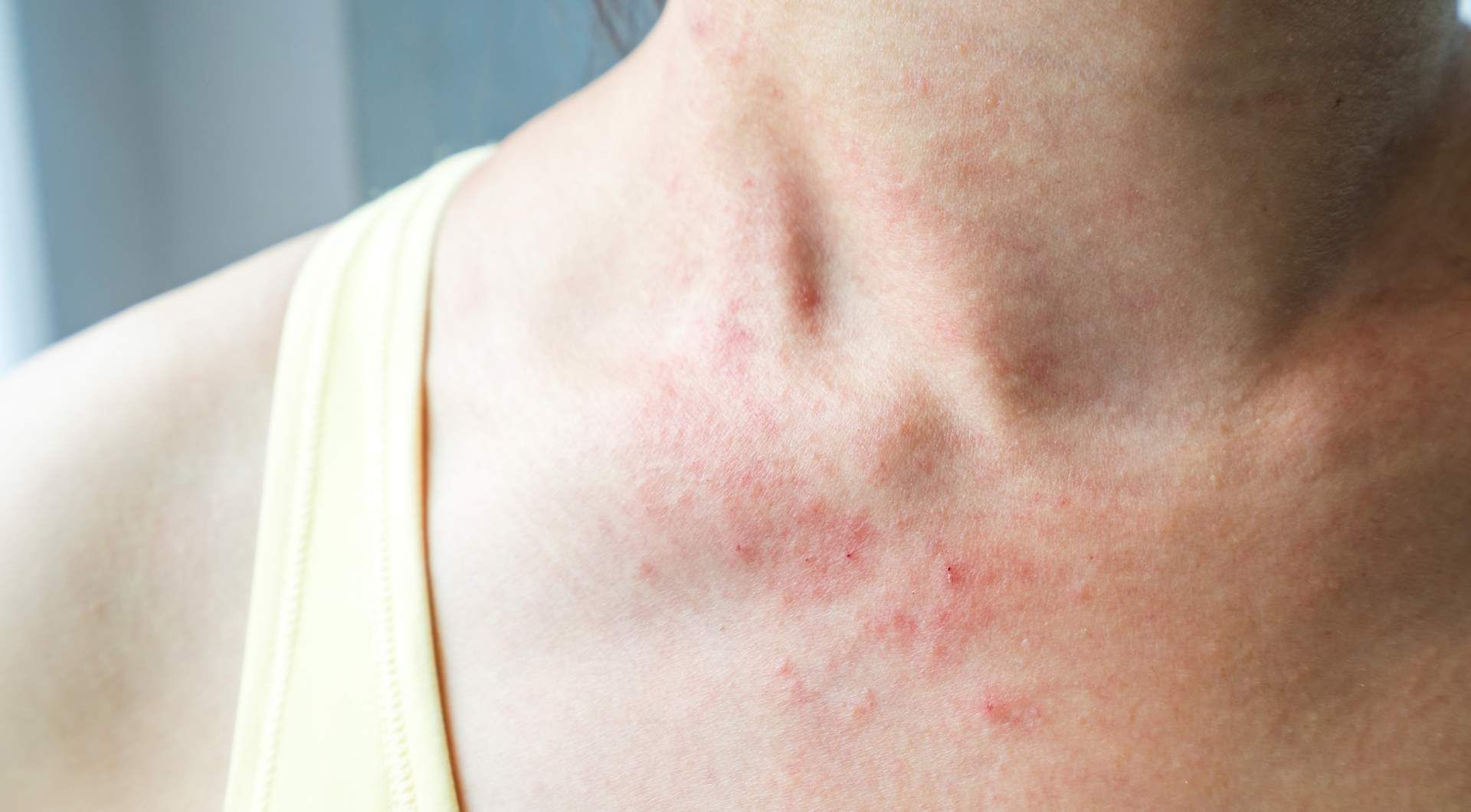How Do You Tell the Difference Between Lupus and Hashimoto's Disease?
"The content below is not intended to be a substitute for professional medical advice, diagnosis, or treatment. Always seek the advice of your physician or other qualified health provider with any questions you may have regarding a medical condition."
You’re familiar with a variety of uncomfortable symptoms, having to manage them from day to day — things like:
- Thinning hair
- Skin issues
- Fatigue
- Mental fogginess
- And more
Could it be lupus? Or maybe you’re dealing with Hashimoto's disease.
With similar symptoms, how do you tell the difference between lupus and Hashimoto’s?
We’ll answer that question by outlining the symptoms, causes, and treatments of each disease along with possible links between the two.
Table of Contents
What Is Lupus?
Lupus, or systemic lupus erythematosus (SLE) — the most common type of lupus — is an autoimmune disease that causes inflammation and pain in different parts of the body. Lupus may affect the:
- Skin
- Joints
- Heart
- Kidneys
- Muscles
In addition to SLE, other types of lupus include:
- Cutaneous lupus (affects only the skin)
- Drug-induced lupus (due to certain prescription drugs)
- Neonatal lupus (affects infants of women who have lupus)
Lupus can be diagnosed at any point in a person’s life. There may be a higher risk of developing lupus in:
- Women between the ages of 15-44
- People of African American, Hispanic, Native American, Asian American, and Pacific Islander descent
- People who have a family history of lupus or other autoimmune conditions
What Is Hashimoto’s Disease?
Also known as chronic lymphocytic thyroiditis or autoimmune thyroiditis, Hashimoto’s disease is an autoimmune disorder that causes inflammation in the thyroid gland.
Hashimoto’s thyroiditis is the most common type of hypothyroidism and results in an underactive thyroid. Fatigue is a common symptom, but because thyroid hormones are involved in how the body uses energy, Hashimoto’s can affect many organs and other parts of your body.
Affecting 5 in 100 Americans, Hashimoto’s thyroiditis can occur at any age. It can also affect both men and women but is more common in women.
Can Hashimoto’s Be Mistaken for Lupus?
Yes, it can be difficult to distinguish between Hashimoto’s and lupus. Because Hashimoto’s disease and lupus share some common symptoms, they may initially be confused with one another.
Some common symptoms of both diseases include:
- Fatigue
- Weight changes
- Poor memory
- Skin issues
- Dry hair
- Cold hands and feet
Is There a Relationship Between Hashimoto’s and Lupus?
Though there is no research to show that one disease causes the other, these autoimmune diseases may be linked and have symptoms that may overlap.
According to a 2020 review by the National Library of Medicine, autoimmune system disorders often happen together, and this link between Hashimoto’s and lupus has been established for over 50 years.
People with lupus may be more susceptible to hypothyroid issues, especially if they are female. The National Library of Medicine review mentioned above also estimates that between 15 –19% of people with lupus also develop primary hypothyroidism.
Though not as commonly documented, there may also be an inverse relationship between Hashimoto’s disease and lupus. Another study showed evidence that Hashimoto’s can increase the risk of new-onset systemic lupus as well.
In addition to these connections, women are more at risk of developing Hashimoto’s or lupus. They are
four to ten times more likely to develop Hashimoto’s than men, and
90% of lupus cases are women.
What’s the Difference Between Hashimoto’s and Lupus?
Symptoms
Symptoms are signs that something in your body is not functioning properly. Doctors assess symptoms to help the diagnostic process, so understanding the symptoms of both lupus and Hashimoto’s can help you know what you may be dealing with and better equip you to talk things over with your health practitioner.
At HealthierU, Dr. Sergi does a thorough evaluation of each client to help discover the underlying issues causing their symptoms. With that information, Dr. Sergi will design a nutritional protocol aimed at relieving those symptoms. Contact HealthierU for a free consultation.
What Are the Symptoms of Lupus?
Because lupus can affect so many parts of the body, symptoms also can be widespread and include:
- Joint swelling
- Joint pain
- Headaches
- Extreme fatigue
- Swelling of hands and feet
- Swelling around the eyes
- Hair thinning
- Low fevers
- Butterfly rash
- Light sensitivity
- Sores in the nose and mouth
- Chest pain when breathing deeply
- Sensitivity to cold and signs of Raynaud’s Disease
- Weight loss
- Swollen lymph nodes
Symptoms may also vary depending on the part of the body affected. For example, if the disease affects the neurological system, you may experience headaches, weakness, tingling, and memory or vision problems. If the disease affects your kidneys, you may experience swelling in the legs.
It’s important to remember that symptoms may come and go, change over time, and vary widely from person to person. Just because you have these symptoms doesn’t necessarily mean you have lupus. Consult your health practitioner for an accurate diagnosis.
What Are the Symptoms of Hashimoto’s?
The first symptom that people with Hashimoto’s may notice is an enlarged thyroid gland (at the front of the neck), also known as a goiter. Though not usually painful, a goiter may cause you to feel pressure in your neck or make it harder to swallow. After many years of damage to the thyroid because of Hashimoto’s, the goiter may disappear as the thyroid gland shrinks.
Other symptoms of an underactive thyroid include:
- Extreme tiredness/fatigue
- Sensitivity to the cold
- Dry skin
- Hair loss
- Weight gain
- Slow heartbeat
- Constipation
- Mental fogginess
- Swollen eyes and face
- Stiff joints
- Muscle aches
- Depression
- Irregular or heavy menstrual periods
Like lupus, each person’s symptoms may vary. Hashimoto’s may progress slowly, and even if blood tests show signs of Hashimoto’s thyroiditis, you may not experience any symptoms when first diagnosed.
Causes
The causes of both lupus and Hashimoto’s are varied and may, at times, be inconclusive. Sharing important information with your practitioner and their thorough evaluation may help shed some light on possible causes.
What Causes Lupus?
Though lupus may occur at any age, women ages 15 to 44 make up 9 out of 10 lupus diagnoses. This leads researchers to believe that estrogen may play a role in what causes lupus.
Other possible causes of lupus include:
- Environmental triggers (UV light, infection, toxins)
- Hormonal factors
- Some medications
- Genetics
A closer look at genetics may be in order when making conclusions about possible causes of lupus.
Twenty percent of people with lupus have a close relative (parent or sibling) who has been diagnosed with lupus or may develop the disease. Additionally, roughly five percent of children with parents who have lupus will also develop the disease.
Even without a family history of lupus, someone diagnosed with lupus may be likely to have someone in their family with another autoimmune disease.
What Causes Hashimoto’s?
Researchers aren’t sure what causes Hashimoto’s disease, but like lupus, there is reason to believe having a family history of the disease may be a factor.
Other factors that may come into play when assessing Hashimoto’s causes include:
- Genetics
- Some medications
- Those to treat mental health disorders
- Medicines containing iodine to treat abnormal heart rhythm
- Viruses, such as hepatitis C
- Toxin exposure
- Infections
- Stress
Diagnosis
Diagnosing
Hashimoto’s and lupus can be challenging since they share many symptoms in common — unless you have a distinctive symptom like a butterfly rash or a family history. Doctors generally make a diagnosis using information from the patient and various lab tests. Sometimes, patients may need to see a specialist, like an endocrinologist or rheumatologist.
How Is Lupus Diagnosed?
Diagnosing both Hashimoto’s and lupus may begin with an antinuclear antibody (ANA) test. Per the name, this test measures the amount of antinuclear antibodies in the bloodstream. These antibodies are made by the immune system and attack parts of the nuclei in the body’s cells.
According to studies, between 20 to 30 percent of the population has these antibodies, but those with higher levels may suggest an autoimmune disorder.
An ANA test doesn’t definitively detect lupus, but it does signal the possibility of an autoimmune disease. According to the American College of Rheumatology, 95 percent of lupus patients have a positive ANA test, while only 11 to 13 percent of people who do the ANA test have lupus.
If you have a positive ANA test, your health practitioner may also want to consider the following in making a diagnosis:
- Complete blood count (CBC): Measures red and white blood cells and platelets
- Urinalysis: Tests how well kidneys are working and can signal if a patient has an infection
- Erythrocyte sedimentation rate: Checks for signs of inflammation by evaluating how quickly red blood cells clump together and then settle at the bottom of a test tube
- Complement levels: Measures proteins from the complement system
- Imaging: X-ray or echocardiogram to test the heart and lungs
- Biopsy: Of skin or kidney
- Neurological exam: To test for weakness and nerve damage
How Is Hashimoto’s Diagnosed?
Though there hasn’t been as much research regarding the ANA test and diagnosing Hashimoto’s, one study published in Medical Principles and Practice found that 17.5% of the 154 participants with autoimmune thyroid disease had a positive ANA test.
Receiving a positive ANA test may prompt doctors to use the following test to confirm or rule out a Hashimoto’s diagnosis:
- TSH: Measures TSH levels (higher levels suggesting a thyroid issue)
- Thyroid antibody: Tests levels of anti-TPO, anti-Tg, and anti-TSH receptor autoantibodies
- Free T4: Tests levels of thyroid hormone in the bloodstream (lower levels suggesting a thyroid issue)
Treatment
Treatment for lupus and Hashitmoto’s may include a mixture of medication and diet and lifestyle changes.
For help managing autoimmune diseases using a holistic approach, contact Dr. Sergi at HealthierU today. After a comprehensive assessment, Dr. Sergi will create a holistic plan that includes nutrition, supplementation, and lifestyle tips to help you manage the disease and its symptoms.
Treatment Options for Lupus
There is no cure for lupus, so health practitioners will work with patients to design a treatment plan to control the symptoms. A treatment protocol may be different for each person and may be dependent on the parts of the body affected and the level of activity of the disease.
Treatment options vary but may include:
- Nonsteroidal anti-inflammatory drugs (NSAIDs)
- Corticosteroids
- Corticosteroid creams
- Methotrexate
- Hydroxychloroquine
- Belimumab and anifrolumab
- Immunosuppressive medications
- Blood thinners
Addressing diet for those with lupus is important. Make sure to include a variety of healthy foods in your diet, including:
- Fruits and vegetables
- Whole grains
- Healthy proteins
- Foods or supplements high in calcium and Omega-3 fatty acids
Those working to manage their lupus symptoms may choose supplementation along with a healthy diet. It’s important to know that some supplements may interact with certain lupus medications. If you’re taking any prescribed medicines, talk to your doctor about adding any supplements to your regimen.
Treatment Options for Hashimoto’s
Treatment for Hashimoto’s may depend on the damage to the thyroid and test results. Patients may not require medication right away. Instead, your doctor may choose to regularly retest your TSH levels to see if the disease is progressing enough to warrant medication.
The most common medical treatment for Hashimoto’s is thyroid replacement with levothyroxine. A doctor may adjust the dosage to determine the level of hormone needed. Some foods can affect how your body absorbs the medication, so check with your health practitioner for the best way to take your medicine daily.
Just like with treating lupus, diet is crucial for treating Hashimoto’s and managing symptoms. Consider these tips for a healthy Hashimoto’s diet:
- Go gluten and grain-free
- Implement the Autoimmune Protocol Diet
- Avoid dairy
- Stick with whole foods
- Consume anti-inflammatory foods, like:
- Vegetables
- Fruits
- Spices
- Fatty fish
-
Supplements to add to a Hashimoto’s diet may include:
- Selenium
- Zinc
- Vitamin D
- B complex vitamins
- Magnesium
HealthierU: Providing Holistic Care for the Treatment of Hashimoto’s and Related Conditions Females
If you’ve been diagnosed with Hashimoto’s disease or another related autoimmune condition and want to do all you can to control your symptoms with a holistic approach, Dr. Sergi can help.
As an experienced professional in women’s health, Dr. Sergi’s goal is to help alleviate your Hashimoto’s or lupus symptoms using natural remedies.
After a thorough examination which involves reviewing a health history form, discussing your concerns, and a physical assessment, Dr. Sergi will create a customized plan with dietary, supplemental, and lifestyle modifications to help you live your life to the fullest — even with an autoimmune disease.
Start your HealthierU journey today by scheduling a free consultation.






